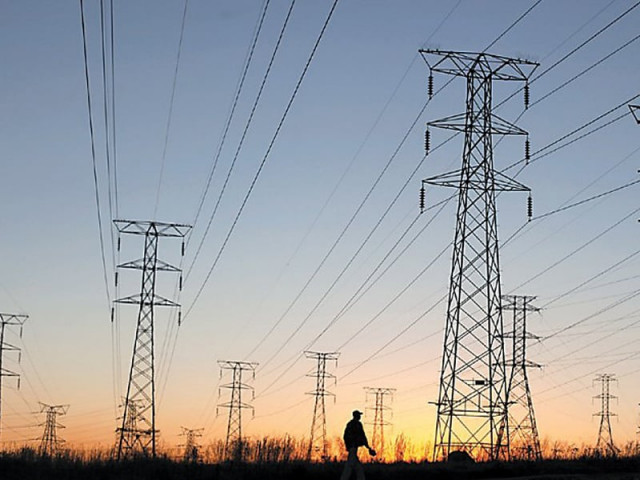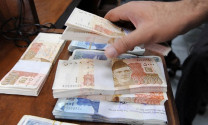Budget 2013-14: Pasha says budget contrary to PML-N’s manifesto
Terms budget ‘ambitious, risky and fragile’, sees inflation rising and deficit widening.

According to Pasha, govt’s power reforms does not make sense as it wants to increase tariffs. PHOTO: FILE
This year will not be different from previous years as the new government will face similar challenges of massive slippages on revenue and expenditure targets while inflation rebounds to double digits as a result of an increase in prices and exchange rate depreciation, said renowned economist and former finance minister Dr Hafiz Pasha.
“The budget is ambitious, risky and fragile with high risks of gaps against the announced targets”, said Pasha. He expressed doubts about the budget deficit target of 6.3%, which was further revised downward to 6%, and stated that the budget deficit will remain at over 7% of Gross Domestic Product (GDP). In a worst scenario, he added, it will further widen to 8.4% of the GDP.
Commenting on the Budget 2013-14 Pasha said that the new budget was contrary to the PML-N’s party manifesto and carried many elements that will threaten macroeconomic stability and fuel inflation. He was speaking at a conference at the Social Policy and Development Centre, a civil society research organisation.
The $5.7 billion target for new loans and grants, and expectations of reducing reliance on banking borrowing for budget financing were unrealistic according to Pasha, who feared that as in previous years the government will rely heavily on borrowing from banks to finance the budget deficit, which will crowd out credit for the private sector.
Pasha warned that the biggest threat was from the Federal Bureau of Revenue (FBR) missing its annual target of Rs2.475 trillion by at least Rs150 billion.
How the FBR can attain a growth rate of over 27% to achieve this year’s target from last year’s growth rate of just 3%, is unclear said Pasha.
Pasha criticised the government for increasing sales tax rate to 17%, arguing that instead of increasing sales tax rates the government should have levied 2% more regulatory duties on luxury items.
“This shows that this is a rich man’s budget”, he added.
He said the government’s desire to reduce subsidies despite increasing prices of electricity and gas may not be fulfilled. The sequence of reforms in the power sector is not correct, explained Pasha, as instead of reducing line losses and controlling theft first, the government wants to increase tariffs first on the insistence of the International Monetary Fund (IMF).
He said a 10% increase in tariffs also increases losses by 5%, resulting in a net revenue increase of only half of what was anticipated at the time of tariff revisions.
Another threat to the macroeconomic plan was the federal government’s desire of getting Rs23 billion in savings from the provincial governments to keep its overall budget deficit at lower ends. Pasha said his estimates suggest that instead of showing any surpluses, the provincial governments will end up creating a combined deficit of Rs92 billion that will widen the national deficit by the same amount.
He also criticised the IMF for imposing the condition of seeking the approval of the Council of Common Interests for binding the provinces to create surpluses. “The IMF has no right to talk about our constitutional arrangements by asking Pakistan to explicitly state provincial surplus budgets”, he added.
Pasha said his biggest fear was that inflation will rebound to previous levels and may reach as much as 12%-13% by the end of this fiscal year due to multiple factors. He said the ballooning budget deficit will push the government to print more notes for budget financing. In addition to this, the impact of Rs2 trillion in borrowing for financing the budget in the last fiscal year will also start appearing in the current fiscal year.
Pasha said the government was also going to increase power tariffs by 25%-30%, which will further fuel inflation. He said in last twelve days the rupee shed its value by Rs1.50 against the US dollar, compared to the last five months when it devalued by only Rs1. This has showed that the State Bank of Pakistan has pulled out of the money market, he added.
Pasha said despite the IMF programme, the risks on the external front have not been averted. The government has under pitched growth in imports while over pitched growth in remittances, and by the time the IMF will approve the bailout the SBP’s reserves will have already fallen by another $1.3 billion to just $4.6 billion.
Published in The Express Tribune, July 12th, 2013.
Like Business on Facebook, follow @TribuneBiz on Twitter to stay informed and join in the conversation.



















COMMENTS
Comments are moderated and generally will be posted if they are on-topic and not abusive.
For more information, please see our Comments FAQ